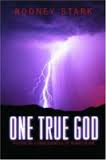There have of course been many books written on monotheism (see e.g the book by Rodney Stark show above). Monotheism itself is a modern post-Enlightenment term, but this doesn’t much matter. The idea and belief is clearly present throughout the Bible. At the level of thought, it was the most fundamental difference between pagans on the one hand, and Jews and Christians on the other in the first century world, and it is still the most fundamental difference between those who affirm the Biblical religion, and polytheists, for example Hindus, or other believers in multiple deities.
Those who wish to argue that Christianity is not a monotheistic religion will have to come to grips with Tom Wright’s recent massive tome entitled Paul and the Faithfulness of God particularly the first major section in Part Two where he discusses early Jewish and early Christian monotheism at great length (over 150 pages worth). Here, I intend to underline a couple of key points he makes, but there are many tell tale signs along the way.
First, however let’s deal with a caricature of Jewish religion that suggests ‘the earliest Israelites were henotheists, not monotheists, simply believing their God was the most high God’. Whatever may have been affirmed by individual Israelites along the way, what the OT says was their ‘official’ position was that YHWH was ‘one’ (see the Shema). This was not a statement over against the possibility that there might be other supernatural beings (e.g. angels or demons), but that there was only one real or true deity in the whole universe– YHWH.
What both Wright, and before him Bauckham have correctly stressed is that this statement that God is one has an external reference, not an internal one. By this is meant that it is not an attempt to define the inner workings of the divine nature (for example how many ways or personal representations the only God could reveal himself in) it is an attempt to make clear that there is only one God over against the claims that there are many, in other words over against any and all forms of polytheism.
In Jewish belief there is one God who created everything in the universe, and is the one ruler over all, and furthermore, all that he created is intrinsically good. In other words, it is a strong statement against any and all forms of dualism, material or moral dualism (for example Gnostic dualism which suggests there is a good and an evil deity, or that spirit is good and matter is evil). No, there is one God, one creation that God made, and one people of God that he has focused his attention and salvific purposes through. Wright calls this creational monotheism.
Wright puts it this way: “The key thing about second-Temple monotheism was not, therefore,a particular proposal about the inner nature of the one God….The main focus of Jewish monotheism in our period, then looked not as it were inward, towards an analysis of the one God, but decidedly outward to the relation of the one God to the world” (pp. 626-27) [and to claims in the world of multiple deities].
For the early Jew, and the original Jewish and also Gentile followers of Jesus, the Creator/creature distinction was fundamental. Creation, and creatures are things that the one Creator God made. They were not part of the creator, and they had no hope of becoming God either. There was, in early Christian thought only one figure who mediated or bridged the gap between God and humankind…. the divine Son of God who took on flesh in the womb of Mary and became a human being, while remaining the divine Son of God.
The earliest Jewish Christians, including James, Peter, Paul, and others insisted this was not a breach or violation of Jewish monotheism, but a further explication of the inner nature of the one God. Tom quite rightly points to the argument in Rom. 3.29-30 where Paul says “Or does God belong only to the Jews? Doesn’t he belong to the nations as well since God is one?” The obvious answer to the first rhetorical question is no, and the second one is yes. There is only one God who is over all peoples, all of creation, and that God made it all.
I agree with Wright as well that Jesus was never seen as a second deity alongside of God the Father, or a human or an angel promoted to divine glory by means of the resurrection. He was on the Creator side of the ledger when the universe was made says John 1, and he made the universe with God the Father. At no point does Paul ever talk about ‘gods’ plural when he refers to the God he or early Christians believed in and worshipped, nor does he use expressions like ‘ekklesia of gods’, no it is always ‘the assembly/church of God’ singular in some place or in general. Of course not, since he so whole-heartedly is able to say ‘since God is One’.












